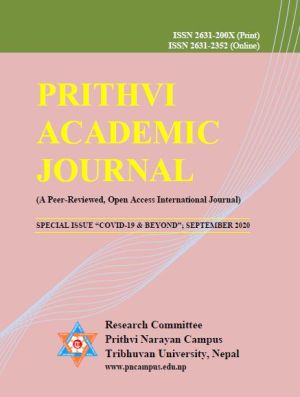The Effect of COVID-19 on Livelihood and Food Security: A Rapid Study in Nepal
DOI:
https://doi.org/10.3126/paj.v3i1.31284Keywords:
COVID-19, Lielihood, food security, coping strategies, economic recoveryAbstract
Conducted during the time of business interruptions and lock-down, this research aims to examine the immediate effect of COVID-19 upon household livelihood, food security and coping strategies. This research has capitalized the part of data of 839 households collected through telephone surveys from 13 districts in May 2020 by World Vision International Nepal. The analysis has revealed that the occurrence of this pandemic pushed additional 11.6 per cent households into food insecurity and reduced average household cash income by 68 per cent. To cope with emerging livelihood and food security issues, the households have adopted different coping strategies viz.: emergency (1.0%), crisis (23.1%), stress (24.0%), and coping not required (52.0%). The ordinal logistic regression test demonstrates that household’s affiliation to saving groups or cooperatives, economic class, rural-urban setting and caste are significant predictors to influence the quality of the household coping strategy. Based on the findings and contemporary other studies, this paper has urged for attention towards the economic recovery of the vulnerable people.




